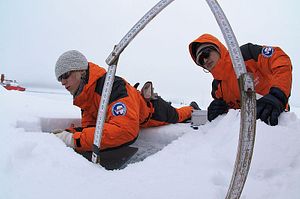Last Friday, the United States announced that it plans to appoint an ambassador to the Arctic region Secretary of State John Kerry said in a statement that “President Obama and I are committed to elevating our attention and effort to keep up with the opportunities and consequences presented by the Arctic’s rapid transformation—a very rare convergence of almost every national priority in the most rapidly-changing region on the face of the earth.”
This week, China’s media picked up the story, framing the move as a U.S. gambit in what China Daily called a “regional race” to access newly accessible natural resources. A People’s Daily article tied Kerry’s announcement to other recent signs of U.S. interest in the Arctic, including last year’s “Arctic National Strategy” and plans by the U.S. Coast Guard to expand cooperative relations in the region.
Chinese media also noted recent Russian and Canadian maneuvers. In December, Canada began working on submitting a claim of sovereignty over the North Pole—causing a Russian Federation Council member to respond, “We will not give the North Pole to anyone.”
Against this backdrop of growing competition, Chinese media were quick to assert China’s interest in the region. Though China has no territory in the Arctic, it has been trying to boost its presence in the region. China recently was named an observer to the Artic Council, whose members include the eight states with territory in the Arctic Circle: Canada, Denmark, Finland, Iceland, Norway, Russia, Sweden, and the United States. In addition to China, other observer states include European powers such as France, Germany, and the UK, and the Asian nations of India, Japan, South Korea, and Singapore.
In addition to taking up observer status in the Arctic Council, China has been actively seeking increased diplomatic and economic ties with Arctic states, hoping to stake a claim to some of the resources becoming accessible as the Arctic ice melts. But recent Chinese media articles are trying to counter accusations that China is planning a “resource grab.” The articles emphasize that Arctic states welcome China’s presence in the region.
A China Daily piece entitled “Bigger Chinese Role Sought in the Arctic” featured an interview with Greenland’s Deputy Foreign Minister Kai Holst Andersen. Andersen told China Daily that Greenland is in discussion with two Chinese mining companies, and he hopes these negotiations “could be an example for other Chinese companies that want to cooperate with Greenland.” He added that Greenland is “definitely a mining nation of the future,” and he made it clear that China’s help would be welcome in boosting Greenland’s mining industry.
The People’s Daily article on the increasing competition in the Arctic was actually titled “Arctic nations look forward to cooperation with China” (an interesting switch from the original Chinese title, which could be translated as “Arctic Contest Heating Up”). The piece ended with a brief assertion from a Swedish researcher that “China will make an important contribution to the [Arctic] Council.”
In the wake of Kerry’s announcement of new U.S. Arctic Ambassador, Chinese media made sure China’s own stake in the Arctic was clear. China will continue to seek increased cooperation with Arctic states to secure a role in developing newly exposed natural resources. China has also emphasized its scientific interest in the region, and the need for multinational cooperation in solving Arctic issues. Whatever happens in the Arctic, China wants to be a part of the decision-making—and to get a piece of the pie. It’s more proof that China’s interests have truly gone global.

































